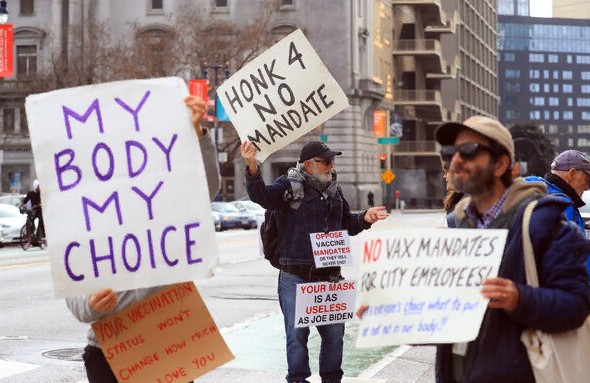Challenges against Biden’s Vaccine Requirements are heard by the Supreme Court.
The conservative majority on the Supreme Court expressed doubt on Friday that the Biden administration has the legal authority to require large firms to require workers to be vaccinated against the coronavirus or to undergo periodic testing.
During a two-hour debate, they said that a federal workplace safety law did not offer a legal basis for the broad emergency measure.
The states and Congress, rather than a federal agency, argued Chief Justice John G. Roberts Jr. and Justice Neil M. Gorsuch, were better equipped to deal with the outbreak. The challenged regulation looked to embrace all major businesses too broadly, according to Justice Amy Coney Barrett.
Given the political and economic concerns, Justices Gorsuch and Kavanaugh suggested that the underlying Act did not plainly authorize the agency to enforce the mandate.
The mandate, according to the court’s three more liberal judges, was a necessary solution to the public health issue.
«We know that getting individuals vaccinated is the greatest method to prevent spread,» Justice Elena Kagan remarked.
Justice Stephen G. Breyer said he would find it «unbelievable» that stopping immunizations would be in the public interest.
Because of the epidemic, some of the participants in the debates were absent from the courtroom. Justice Sonia Sotomayor, who has been the only member of the court to wear a mask since the justices returned to the courtroom in October, took part from her chambers.
The court stated Friday morning that two of the lawyers — Ohio’s solicitor general, Benjamin M. Flowers, and Louisiana’s solicitor general, Elizabeth Murrill — would argue by phone, but gave no justification. Lawyers must be tested for the virus as part of the court’s Covid guidelines. «An arguing attorney who receives a positive test will not be expected to argue in person, but would be asked to participate remotely through a telephone connection to the courtroom,» the regulations state.
According to a court spokesman, all of the justices have been completely immunized and have received a booster injection.
Two challenges to the administration’s reaction to the pandemic are currently before the court.
The first debate focused on a bill that would require more than 84 million people to be vaccinated or tested if they worked for a company with 100 or more employees. According to the administration, the rule will result in the vaccination of 22 million individuals and the avoidance of 250,000 hospitalizations.
The second debate, which began shortly after noon, is over a bill requiring coronavirus vaccination for personnel in hospitals and other healthcare facilities that participate in the Medicare and Medicaid programs. According to the administration, the measure would affect more than 17 million workers and would «save hundreds, if not thousands, of lives each month.»
In a series of cases, the Supreme Court has sustained state vaccine mandates despite constitutional concerns. The cases before the court are distinct in that they focus on whether Congress has given the executive branch authority to impose the restrictions.
The answer will largely depend on the terms of the applicable statutes and whether the administration issued the regulations in accordance with proper processes.
The Occupational Safety and Health Administration, or OSHA, of the Department of Labor, imposed the vaccination-or-testing regulation for major businesses in November.
Employers may offer their employees the alternative of being tested weekly rather than receiving the vaccine, but they are not compelled to pay for the testing. Employees with religious objections and those who do not come into close contact with other people at their jobs, such as those who work at home or exclusively outdoors, are exempt from the restriction.
OSHA has the authority to adopt emergency workplace safety rules under a 1970 legislation if it can show that workers are in grave danger and that the rule is essential.
In appellate courts across the country, states, corporations, and others challenged the act, and a unanimous three-judge panel of the United States Court of Appeals for the Fifth Circuit in New Orleans ruled in favour of some of the challengers, blocking the measure.
A divided three-judge court reinstated the legislation after the cases were consolidated before the United States Court of Appeals for the Sixth Circuit in Cincinnati.
For the majority, Judge Jane B. Stranch stated, «The record indicates that Covid-19 has continued to spread, mutate, kill, and obstruct the safe return of American workers to their occupations.» «In order to protect workers, OSHA must be able to respond to hazards as they arise.»
The Coronavirus Pandemic: Key Things to Know
Judge Joan L. Larsen, writing in dissent, stated that the administration «certainly lacks congressional power» to impose the vaccine or testing mandate.
She added, «The mandate is directly targeted at shielding the unvaccinated from their own choices.» «Vaccines are freely available, and persons who have not been vaccinated can choose to protect themselves at any time.»
The challengers asserted in National Federation of Independent Business v. Department of Labor, No. 21A244, that the regulation did not address a workplace issue and thus overstepped the agency’s legal power. In a recent petition to the Supreme Court, lawyers for Ohio and 26 other states stated, «Covid-19 is not an occupational hazard that OSHA may regulate.»
They went on to say that agencies attempting to establish regulations on «major concerns» with broad economic or political ramifications need unambiguous congressional approval.
The second case, Biden v. Missouri, No. 21A240, is a November regulation requiring health care workers at facilities receiving federal funds under the Medicare and Medicaid programs to be vaccinated against the coronavirus unless they meet medical or religious exemptions.
The regulation was challenged by states governed by Republican politicians, who were successful in securing injunctions against it that covered almost half of the country. In New Orleans and St. Louis, two federal appeals courts refused to stay the injunctions while the appeals were being heard.
In Atlanta, a third federal appeals court sided with the Biden administration. Judges Robin S. Rosenbaum and Jill A. Pryor wrote for a divided three-judge panel that «health care workers have long been required to obtain inoculations for infectious diseases, such as measles, rubella, mumps, and others,» because «required vaccination is a common-sense measure designed to prevent health care workers, whose job it is to improve patient’s health, from making them sicker.»
The Biden administration claimed that a federal statute provided it extensive jurisdiction to enforce controls on the health and safety of patients at federally funded facilities. The secretary of the Department of Health and Human Services has broad authority to issue regulations to ensure «efficient administration» of the Medicare and Medicaid programs, and sections of the statute governing various types of facilities allow the secretary to impose requirements to protect patients’ health and safety.
In a Supreme Court brief, Ms Prelogar wrote, «It is difficult to imagine a more paradigmatic health and safety condition than a requirement that workers in hospitals, nursing homes, and other medical facilities take the step that most effectively prevents transmission of a deadly virus to vulnerable patients.»
Attorneys for Missouri and other states responded by writing that the «sweeping and unprecedented vaccine mandate for health care employees threatens to cause a crisis in rural America’s health care institutions.»
«Millions of people would be forced to choose between losing their jobs and complying with an illegal federal mandate,» they wrote. «Last year’s health care heroes would have become this year’s unemployed» if a judge hadn’t given an injunction, they added.






Be the first to comment on "Challenges against Biden’s Vaccine Requirements are heard by the Supreme…"